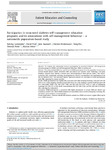Participation in structured diabetes self-management education programs and its associations with self-management behaviour – a nationwide population-based study
Carmienke, Solveig
Fink, Astrid
Baumert, Jens
Heidemann, Christin
Du, Yong
Frese, Thomas
Heise, Marcus
Objective:
To evaluate the relationship between participation in structured diabetes self-management education programs (DSME) and self-management behaviour (SMB) in routine care.
Methods:
The study included 864 ever- and 515 never-DSME participants from the population-based survey German Health Update (GEDA) 2014/2015. SMB and clinical care variables were: Following a diet plan, keeping a diabetes diary, holding a diabetes pass, self-monitoring of blood glucose (SMBG), foot self-examination (FSE), retinopathy screening, haemoglobin A1c (HbA1c) measurement and examination of the feet by clinicians (FEC). We conducted logistic regression analyses for association of DSME-participation with SMB, adjusting for various variables.
Results:
DSME-participation was significantly associated with SMB including following a diet plan (OR 1.88 [95% CI 1.21–2.92]), keeping a diabetes journal (OR 3.83 [2.74–5.36]), holding a diabetes health passport (OR 6.11 [4.40–8.48]), SMBG (OR 2.96 [2.20–3.98]) and FSE (OR 2.64 [2.01–3.47]) as well as retinopathy screening (OR 3.30 [2.31–4.70]), HbA1c measurement (OR 2.58 [1.88–3.52]), and FEC (OR 3.68 [2.76–4.89]) after adjusting for confounders.
Conclusion:
DSME-participation is associated with higher frequencies of various SMB and clinical care variables in routine care. Never-DSME attenders are more likely not to receive retinopathy screening, FEC and HbA1c measurements as recommended.
Practice implications:
Clinicians should refer diabetes patients to a DSME and ensure a regular follow up for never-DSME attenders.
Files in this item

